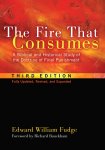Edward William Fudge’s The Fire That Consumes (3rded.) makes an exhaustive—and occasionally exhausting—biblical and historical case for a conditionalist understanding of hell. Traditionalism teaches that “God will make the wicked immortal, to suffer unending conscious torment in hell.” By contrast, conditionalism teaches that “the wicked will finally and truly die, perish, and become extinct forever, through a destructive process that encompasses whatever degree and duration of conscious torment God might sovereign and just impose in each case.” According to Fudge, the duration of hell’s torments is the only issue that divides the two camps.
The biblical component of Fudge’s case occupies the first 23 chapters of the book, in which Fudge surveys passages from the Old Testament, intertestamental literature, and New Testament that bear on his argument. The historical component occupies the next 11 chapters, starting with the Apostolic Fathers and ending with late-twentieth century conditionalists. Chapter 35 summarizes the argument of the entire book, and chapter 36 offers several brief thoughts about how the debate should be conducted going forward.
Though summarizing a nearly 400-page book is a hazardous endeavor, it seems to me that Fudge’s cumulative case makes the following basic points:
-
- The Bible is the final authority to settle theological debates about hell.
-
- The Bible promises “eternal life” and “immortality” to those who put their faith in Jesus Christ for salvation.
-
- By contrast, the Bible portrays the fate of the wicked as “destruction” and “death.” Since the Bible does not teach that the wicked have “eternal life,” the images of destruction and death are best understood as “extinction forever.” This coheres with the image of “fire” often used to describe hell, for fire consumes what it burns.
-
- Applied to the fate of the wicked, the adjective “eternal” points not to an everlasting process of being punished, as traditionalists argue, but to the everlasting result of a terminal process of punishment.
-
- Though church history is not the final authority in the debate over hell, it does indicate that conditionalism was a widespread view among church fathers prior to Augustine. Since Augustine, traditionalism has been the majority position.
-
- At the present time, conditionalism is gaining adherents among evangelical theologians. Even traditionalists argue that many of the conditionalists—Fudge himself, John Stott, John Wenham, Philip Edgcumbe Hughes, and the like—are otherwise evangelicals in good standing. In other words, the issue at stake in the debate is not biblical inerrancy, the Trinity, Incarnation, Atonement, or other first-level Christian doctrine, but rather a second-level doctrine, namely, how long hell endures.
The bulk of Fudge’s book centers on points 2 and 3 above, which can be summarized quickly but takes a long time to document.
Whether or not one agrees with Fudge, The Fire That Consumes is essential reading for anyone interested in a biblical doctrine of hell. This is admitted by traditionalists themselves, who often take Fudge’s writings as the point of departure in their critiques of conditionalism. For the traditionalist view, I would recommend the multi-author Hell Under Fire, edited by Christopher W. Morgan and Robert A. Peterson. It interacts with an earlier edition of Fudge’s book, and Fudge’s third edition replies in turn to its critiques.
 Book Reviewed
Book Reviewed
Edward William Fudge, The Fire That Consumes: A Biblical and Historical Study of the Doctrine of Final Punishment, 3rded. (Eugene, OR: Cascade Books, 2011).
P.S. If you found this review helpful, please click “Helpful” on my Amazon review page.

